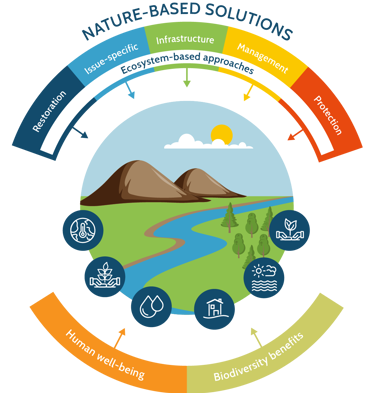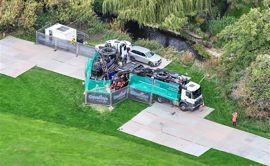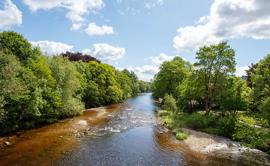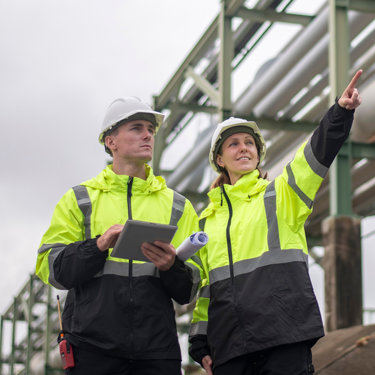How nature-based solutions offer a technically sound and cost-effective future for the water industry
Published: 27 March 2024
The WWT Wastewater 2024 Conference at the end of January saw the water industry take heed from science and natural technologies to utilise nature-based solutions (NbS).
Noticeably, a paradigm shift from the traditional reliance on ‘grey’ infrastructure seems to be driven by a confluence of factors: escalating costs of traditional infrastructure, the urgency of climate change adaptation, and a growing public demand for sustainable solutions.

Understanding nature-based solutions
Nature-based solutions offer a technically sound and cost-effective approach, utilising natural processes to address water challenges.

As the UK water industry gears up for AMP8 with a significant £3.5 billion investment earmarked for nature-based solutions, it's crucial to understand the technical intricacies and diverse benefits these solutions offer.
Nature-based solutions offer a symphony of technical expertise and natural processes, encompassing a diverse range of interventions.
Floodplain and wetland restoration
These natural buffers involve complex hydrological modelling to simulate floodwater behaviour and optimise the design for effective flood risk mitigation. Recent advancements in LiDAR technology facilitate high-resolution topographic mapping, enabling precise floodplain delineation and restoration planning.
Green infrastructure
Solutions like bioretention basins and permeable pavements require careful consideration of soil properties, hydraulic conductivity, and filtration media to ensure efficient stormwater management and prevent unintended consequences like groundwater contamination.
Riparian zone protection and restoration
This involves bioengineering techniques like bank stabilisation with vegetation and the use of native plant species specific to the local ecosystem. Expertise in fluvial geomorphology and ecological restoration is crucial for ensuring long-term sustainability and biodiversity enhancement.
Benefits beyond the bottom line
While cost savings are a major attraction, the benefits of nature-based solutions for water management extend far beyond the bottom line.
Let’s dive into the technical advantages of nature-based solutions, showcasing their multifaceted value for the water industry and explore how NbS can offer resilience, cost-effectiveness, faster implementation, and even improved water quality.
Resilience in a changing climate
Climate change necessitates adaptation strategies that are robust and adaptable. Nature-based solutions offer inherent resilience due to their natural adaptability to changing environmental conditions. For example, restored wetlands can dynamically adjust their storage capacity based on seasonal variations in precipitation, mitigating both flood risk and drought stress.
Cost-effectiveness
Compared to traditional infrastructure projects, nature-based solutions often boast lower life cycle costs. The initial investment might be comparable, but nature-based solutions typically require less ongoing maintenance and offer inherent ecological benefits that reduce long-term operational costs.
A 2022 World Bank study comparing nature-based solutions and grey infrastructure for various applications found that NbS often have lower life cycle costs, especially when considering long-term maintenance and potential future climate change adaptation needs.
Speed of delivery
Nature-based solutions projects can often be implemented faster than traditional infrastructure projects due to streamlined permitting processes and less reliance on complex construction procedures.
For instance, planting trees or restoring riparian buffers can be implemented in a shorter timeframe compared to building a new water treatment plant.
This quicker turnaround time allows the water industry to address urgent water challenges more promptly and efficiently, as highlighted in a 2021 UN Environment Programme report.
Improved water quality
Nature-based solutions, like constructed wetlands, leverage natural biological processes to remove pollutants and nutrients from water.
These systems utilise complex microbial communities and engineered designs to achieve efficient pollutant removal, often surpassing the capabilities of traditional chemical treatment processes.
A 2023 study by Cranfield University demonstrated the effectiveness of constructed wetlands in removing emerging contaminants like pharmaceuticals from wastewater, reducing the need for expensive and energy-intensive treatment processes.
Embracing a collaborative future
The successful implementation of nature-based solutions requires collaboration among water companies, policymakers, scientists, and communities. This collaboration is crucial for ensuring the effective planning, financing, and long-term maintenance of nature-based solutions projects.
By leveraging technical expertise, fostering collaboration, and embracing the power of nature, the water industry can shape a resilient and sustainable future for all.
More from our Knowledge Hub
 Case study
Case studyGroup companies Detectronic and Oneline combine to deliver hydraulic improvements at Meole Brace Golf Course
 Insights
InsightsA prevention-first future: Our response to the government’s white paper, 'A New Vision for Water'
 Insights
InsightsFrom insight to impact: Delivering a solution to pollution at WWT Wastewater 2026
 Case study
Case studySafeguarding data centre continuity through strategic DSEAR risk assessment
Environmental compliance today, creating a sustainable tomorrow
Helping you reduce risk to the environment and your operation by managing assets compliantly while achieving commercial, ESG, and net-zero goals.
Contact our experts
